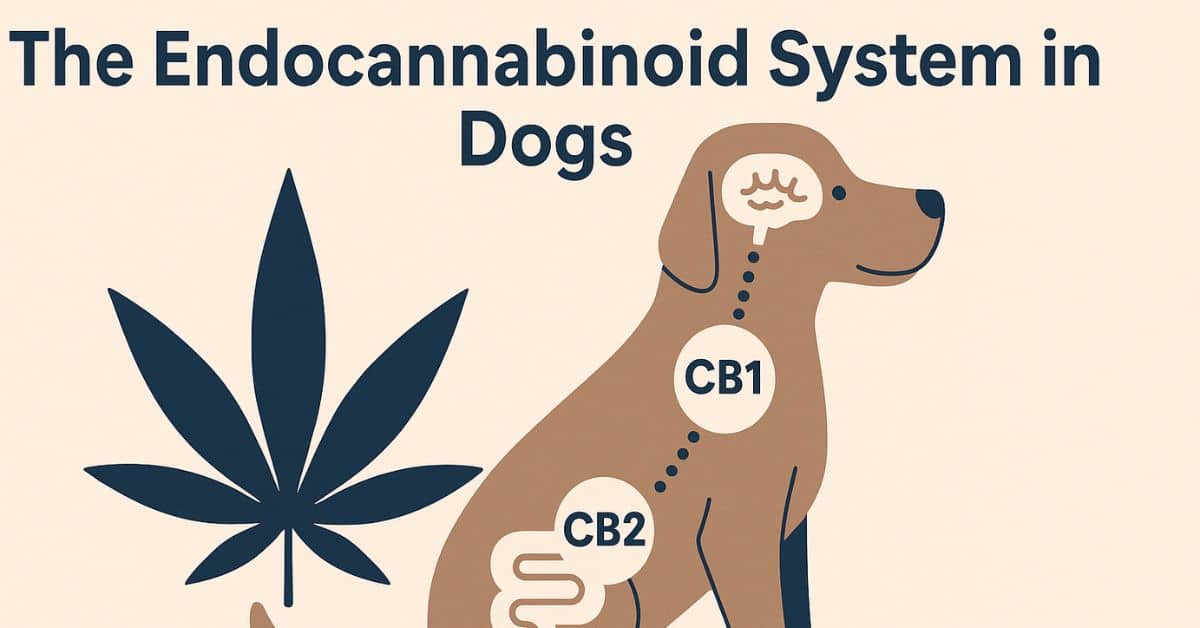The endocannabinoid system (ECS) is a natural regulatory system found in all mammals, including dogs. It plays a key role in maintaining homeostasis by helping regulate essential functions such as mood, pain perception, appetite, immunity, and sleep.
In simple terms, the ECS works like your dog’s internal communication network, constantly responding to changes in the body to keep everything running smoothly. Whether your dog is stressed, injured, or fighting off inflammation, the ECS helps restore balance and support recovery.
Discovery of the ECS in Animals
The endocannabinoid system (ECS) was discovered in the early 1990s during research on how THC, the psychoactive compound in cannabis, affects the brain. Scientists found that the body produces its own cannabinoids, called endocannabinoids, which bind to specific receptors to help regulate vital functions.
Researchers soon confirmed that animals, including dogs, have the same system. This showed that the ECS is a universal biological system found in all mammals.
In veterinary medicine, the discovery of the ECS has led to growing interest in using natural compounds like CBD to support pain relief, reduce inflammation, manage anxiety, and improve overall wellness in dogs.
How the ECS Works in Dogs
The endocannabinoid system in dogs helps regulate balance throughout the body. It acts as a communication network between cells, working to maintain stability when your dog experiences stress, injury, or illness. It responds to internal changes by adjusting functions like pain sensitivity, immune activity, and mood.
The ECS is made up of three core parts:
- Endocannabinoids produced naturally by your dog’s body
- Cannabinoid receptors located throughout the brain and body
- Enzymes that break down endocannabinoids once they’ve done their job
When something disrupts your dog’s internal balance, the ECS steps in to restore it.
Components of the Canine Endocannabinoid System
Endocannabinoids
These are chemical messengers created by your dog’s body that activate ECS receptors. The two most studied are:
- Anandamide (AEA): Helps regulate mood and manage pain
- 2-Arachidonoylglycerol (2-AG): Involved in immune response and inflammation control
Cannabinoid Receptors
ECS receptors are found throughout the body and determine how endocannabinoids affect each system:
- CB1 receptors: Located in the brain and nervous system, they influence mood, pain, and motor control
- CB2 receptors: Found in the immune system and organs, they regulate inflammation and immune response
Enzymes
Once endocannabinoids complete their function, enzymes break them down:
- FAAH (Fatty Acid Amide Hydrolase): Breaks down anandamide
- MAGL (Monoacylglycerol Lipase): Breaks down 2-AG
The ECS and Your Dog’s Health
Pain and Inflammation
The ECS helps manage your dog’s pain response by controlling how the brain and body perceive discomfort. This is especially useful for dogs with arthritis or injury-related inflammation.
Mood and Anxiety
Endocannabinoids like anandamide support emotional regulation. A well-functioning ECS can reduce stress, hyperactivity, and fear-based behaviors.
Appetite and Digestion
The ECS helps stimulate appetite and regulate digestion. This becomes important during illness or recovery, when your dog may struggle to eat or process food properly.
Immune Function
CB2 receptors guide immune cell activity. A balanced ECS prevents overactive responses like allergies and supports proper healing.
Sleep Cycles
ECS activity contributes to stable sleep-wake patterns. Dogs with restless sleep or difficulty settling down may benefit from ECS support.
How CBD Supports the ECS in Dogs
CBD (cannabidiol) is a non-intoxicating compound from hemp. Unlike THC, CBD doesn’t bind directly to ECS receptors. Instead, it works behind the scenes to strengthen the system’s overall function.
CBD may:
- Block FAAH, increasing levels of anandamide
- Promote relaxation and calm behavior
- Reduce inflammation by modulating immune response
CBD works with your dog’s ECS rather than against it, which makes it a promising option for natural support.
Is CBD the Same as THC?
No. THC is the compound in cannabis that causes a high, and it can be harmful to dogs. CBD is non-psychoactive and safe when sourced from high-quality hemp. Legal CBD products for pets contain less than 0.3% THC, which is too low to cause any intoxicating effects.
Scientific Studies on CBD and the ECS in Dogs
Research supports the use of CBD to support the ECS and improve canine health:
- Cornell University: Dogs with arthritis showed better mobility and pain relief after receiving CBD oil
- Colorado State University: Dogs with epilepsy experienced fewer seizures when given CBD
ECS Dysfunction in Dogs
When the ECS is out of balance, your dog may experience a condition known as Clinical Endocannabinoid Deficiency (CECD). Though research is ongoing, possible signs include:
- Chronic inflammation or joint pain
- Anxiety or aggressive behavior
- Digestive issues
- Low appetite
- Poor sleep patterns
Supporting the ECS with proper nutrition, exercise, and CBD may help restore balance.
Signs Your Dog May Benefit from CBD
If your dog shows any of the following symptoms, CBD may help:
- Limping, stiffness, or joint pain
- Excessive barking or separation anxiety
- Skin irritation or allergy symptoms
- Digestive upset or lack of appetite
- Seizures or tremors
- Difficulty sleeping
Talk to your veterinarian before introducing any CBD product into your dog’s routine.
Choosing the Right CBD Products for Dogs
To effectively support the ECS, always choose:
- Full-spectrum or broad-spectrum CBD for added plant compounds that boost effectiveness
- Third-party tested products with Certificates of Analysis (COAs)
- Pet-specific formulas that avoid harmful ingredients like xylitol or artificial sweeteners
- Correct dosing methods like oils, chews, or capsules based on your dog’s size and needs
Bottom Line
The endocannabinoid system plays a vital role in your dog’s overall wellness. It influences pain, mood, sleep, digestion, and immune response. When balanced, your dog can feel calmer, move more comfortably, and enjoy better quality of life.
CBD is a natural, science-backed way to support the ECS in dogs. With the right products and veterinary guidance, you can help your dog thrive.

